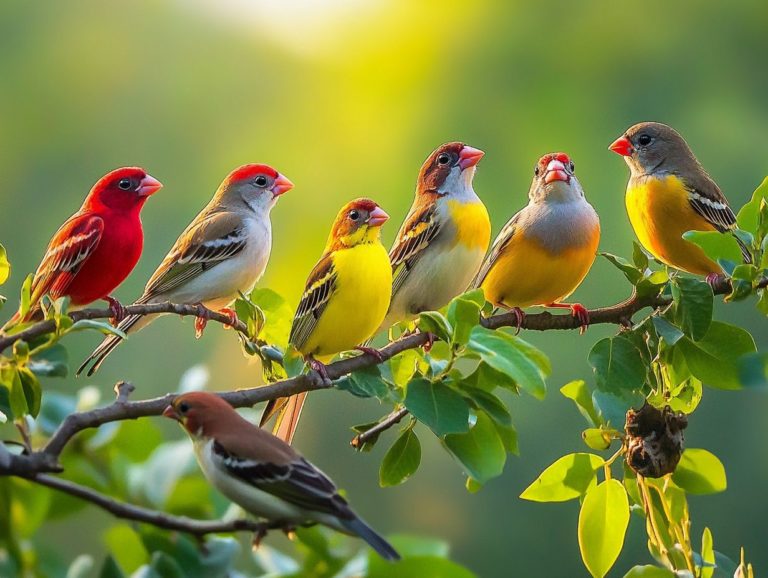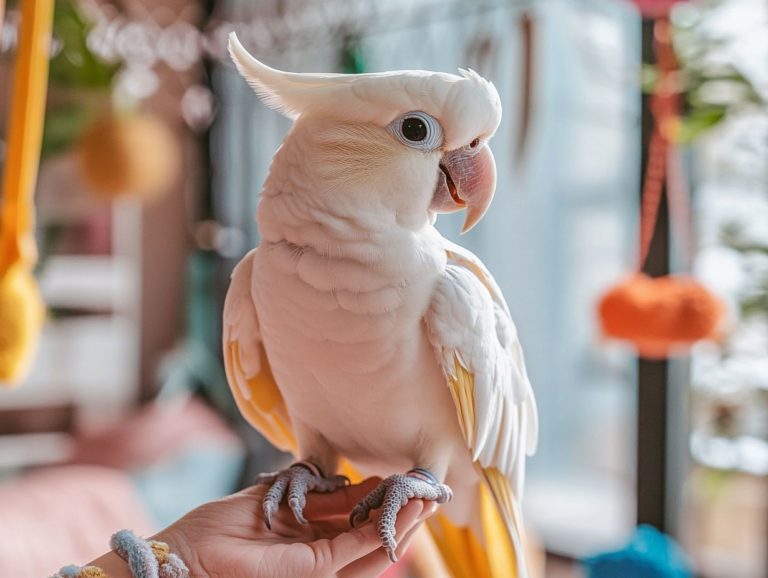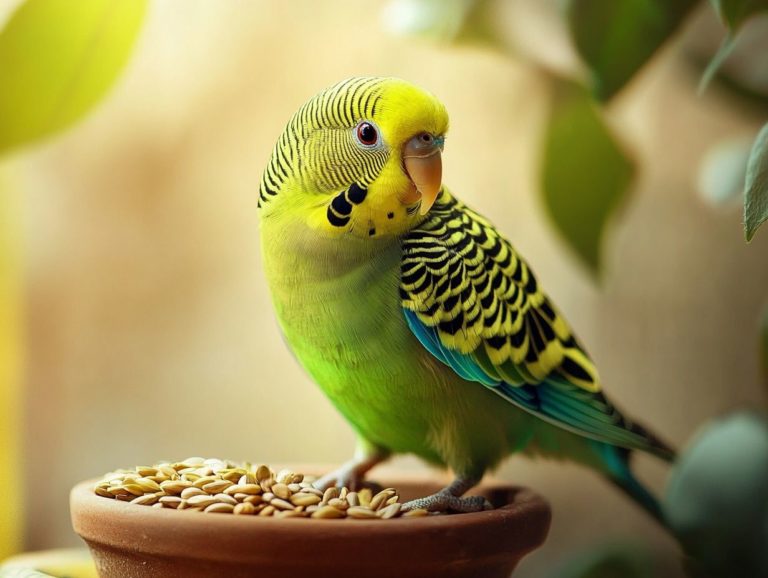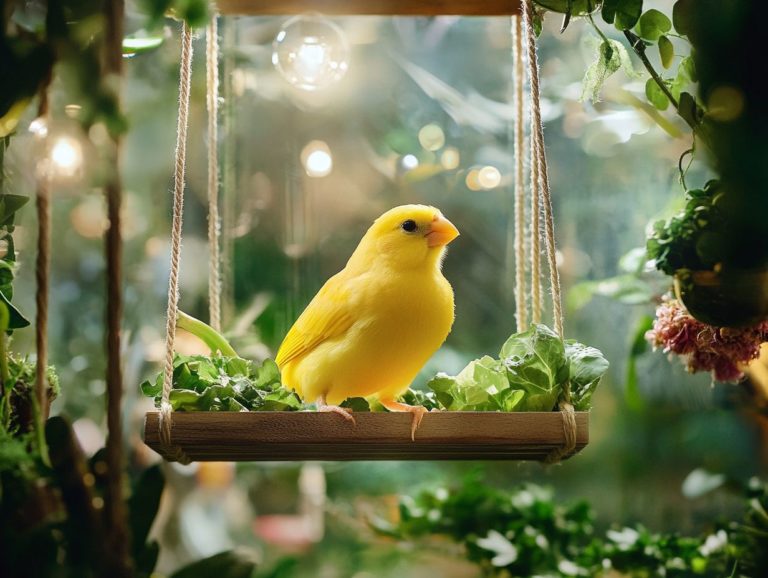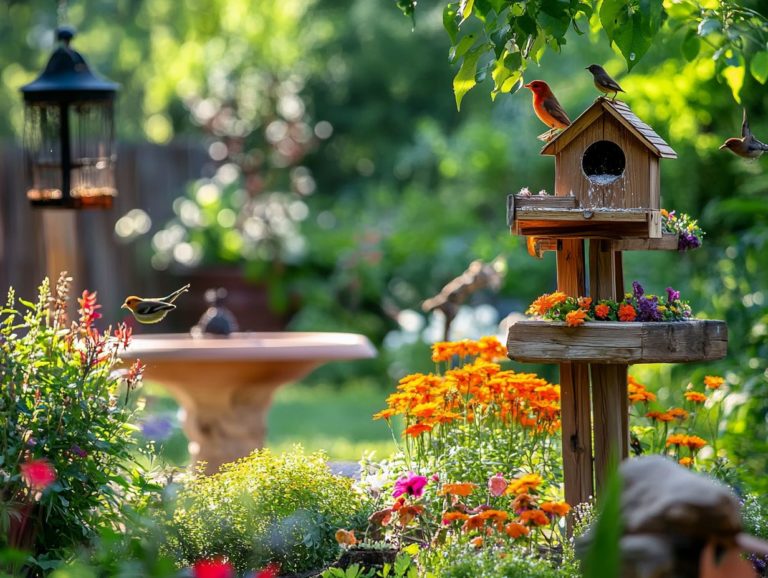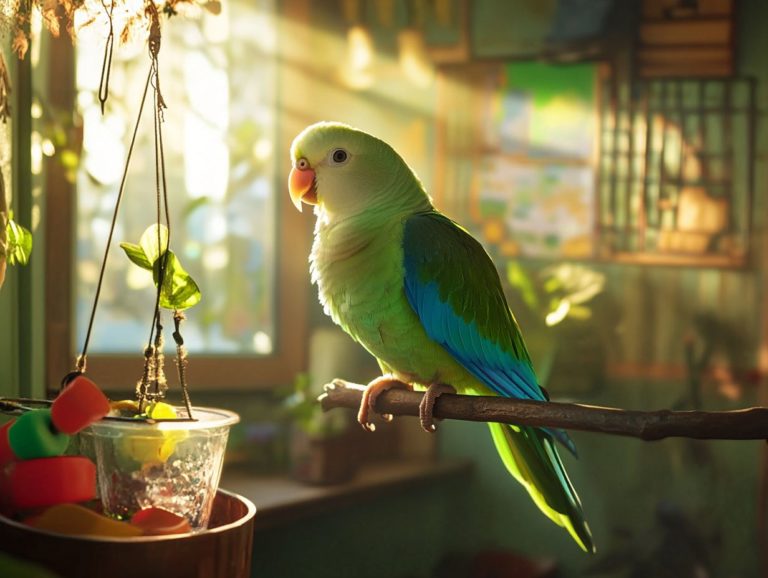Adopting a Quaker Parrot: What to Expect
Considering welcoming a Quaker parrot into your family? Quaker parrots are vibrant and smart companions that will brighten your life! However, they may not suit everyone s lifestyle.
It s crucial to grasp their unique needs and characteristics. This guide will walk you through key considerations before making the leap into adoption, how to prepare your home for your new avian friend, and essential tips for their care and training.
Get ready to uncover whether a Quaker parrot is the perfect pet for you!
Contents
- Key Takeaways:
- Is a Quaker Parrot the Right Pet for You?
- Preparing for Your New Quaker Parrot
- Bringing Your Quaker Parrot Home
- Caring for Your Quaker Parrot
- Behavior and Training of Quaker Parrots
- Understanding and Addressing Common Behaviors
- Behavioral Training Techniques
- Frequently Asked Questions
- What is a Quaker Parrot?
- Is adopting a Quaker Parrot a good idea?
- What should I expect when bringing home a Quaker Parrot?
- Do Quaker Parrots require any special care?
- How long do Quaker Parrots typically live?
- Are Quaker Parrots suitable for families with children?
Key Takeaways:

- A Quaker Parrot can make a great pet, but it’s important to consider if it’s the right fit for your lifestyle and living situation.
- Before bringing home a Quaker Parrot, make sure you have all the necessary supplies and set up its new environment and routine to help it feel comfortable.
- Proper nutrition, grooming, and exercise are important for keeping your Quaker Parrot happy and healthy. Understanding their behaviors and providing training can also help improve their overall well-being.
Is a Quaker Parrot the Right Pet for You?
Deciding if a Quaker parrot is the right pet for you requires a thoughtful examination of your lifestyle, your dedication to parrot care, and an understanding of their specific needs, including what you should know about bird adoption.
These affectionate birds, celebrated for their playful personalities and vocalizations, can forge deep connections with their primary caregivers. It s essential to evaluate your capacity for social interaction and companionship.
With an impressive lifespan of up to 30 years, adopting a Quaker parrot is a long-term commitment. It demands careful consideration of your ability to provide activities to keep your parrot engaged and create a healthy environment, including understanding essential care for adopted parrots, to nurture a trusting relationship.
Considerations Before Adopting
Before you decide to welcome a Quaker parrot into your home, consider factors that will affect both your well-being and that of the bird, including unique care tips for a Quaker parrot.
Understanding the potential for negative behaviors, such as biting or screaming, can save you from future frustration. These behaviors often arise from stress or unmet needs.
Establishing a routine for regular veterinary check-ups is essential to ensure the bird’s health and happiness. A consistent feeding schedule is also important; it aligns with the bird’s dietary needs and contributes significantly to their overall stability.
A balanced diet tailored specifically to their nutritional requirements can improve their behavior. It can also enhance their quality of life, fostering a harmonious relationship that will thrive.
Preparing for Your New Quaker Parrot
Welcoming a new Quaker parrot into your home calls for meticulous preparation and an organized strategy to create the perfect environment. Begin by ensuring that the cage is at least 60cm wide and filled with a variety of toys and puzzles.
This thoughtful setup not only enhances your parrot’s mental stimulation but also significantly boosts its overall well-being. By providing a diverse and enriching habitat, you can effectively minimize negative behaviors while deepening your bond with your new feathered friend.
Essential Supplies and Set-Up
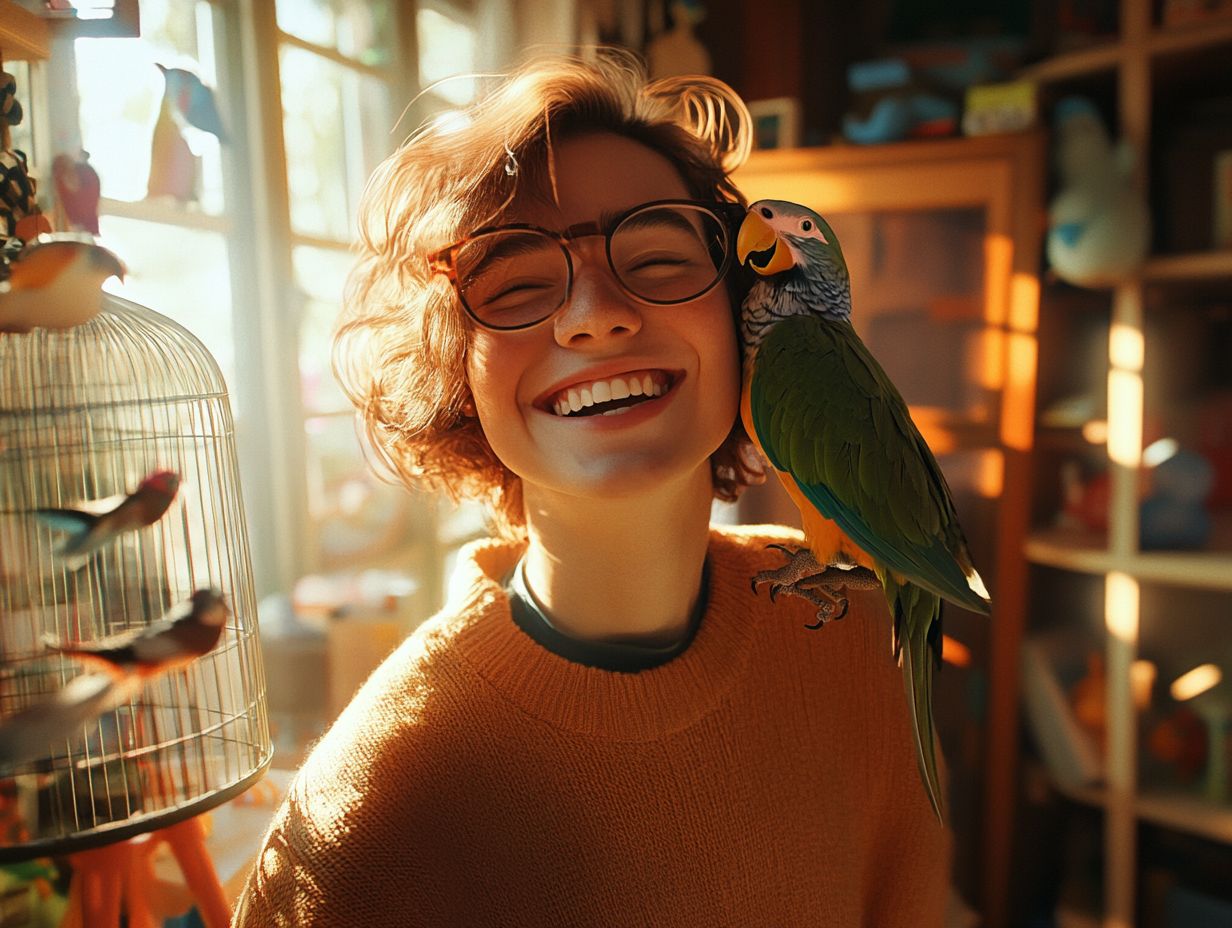
The essential supplies for your Quaker parrot include the right food, a spacious cage, and toys that foster environmental enrichment.
To keep your Quaker parrot healthy, it s imperative to provide a balanced diet featuring high-quality pellets, fresh fruits, and vegetables. Be sure to avoid anything toxic to meet their diet requirements.
Along with their nutritional needs, providing a selection of sturdy toys such as:
- Rope swings
- Foraging puzzles (toys that encourage birds to search for food)
- Chewable materials
can significantly enhance their playtime and serve as positive reinforcement during training.
Creating a welcoming cage setup with perches at varying heights, natural branches, and safe hiding spots will help reduce stress. This fosters a sense of security and comfort during their adjustment period.
Your new feathered friend awaits! Prepare today, and give your Quaker parrot the best start in its new home!
Bringing Your Quaker Parrot Home
Bringing your Quaker parrot home starts an essential adjustment period. This phase is crucial for fostering social interaction and building trust with your new companion, and knowing what to do can help. Refer to this bird adoption guide for tips on managing the initial transition.
In those first 72 hours, it’s imperative to let the bird acclimate to its new environment. Keeping stress levels low is key. Prioritize gentle interactions, create a safe space, and slowly introduce your presence. This approach will encourage bonding and help establish a foundation of trust.
Introducing to New Environment and Routine
Introducing your Quaker parrot to its new environment and routine is a crucial step in ensuring a seamless transition. This fosters a sense of comfort.
Establishing a consistent feeding schedule is vital. It provides your feathered friend with a sense of security and aligns with its natural rhythms. Equally important is the cage arrangement, which plays a significant role in their well-being. By ensuring an abundance of perches, toys, and a bit of privacy, you can greatly enhance their comfort level.
To encourage vocalization and interaction, engage your parrot with gentle sounds, songs, or even spoken words. Creating a fun environment helps your bird feel at home quickly! Over time, these practices will assist your parrot in adjusting, thriving, and forming a meaningful bond with you.
Caring for Your Quaker Parrot
Caring for your Quaker parrot demands a thoughtful and well-rounded approach. You ll want to focus on providing a balanced diet, ensuring regular grooming, and establishing exercise routines that foster both health and happiness.
Nutrition, Grooming, and Exercise
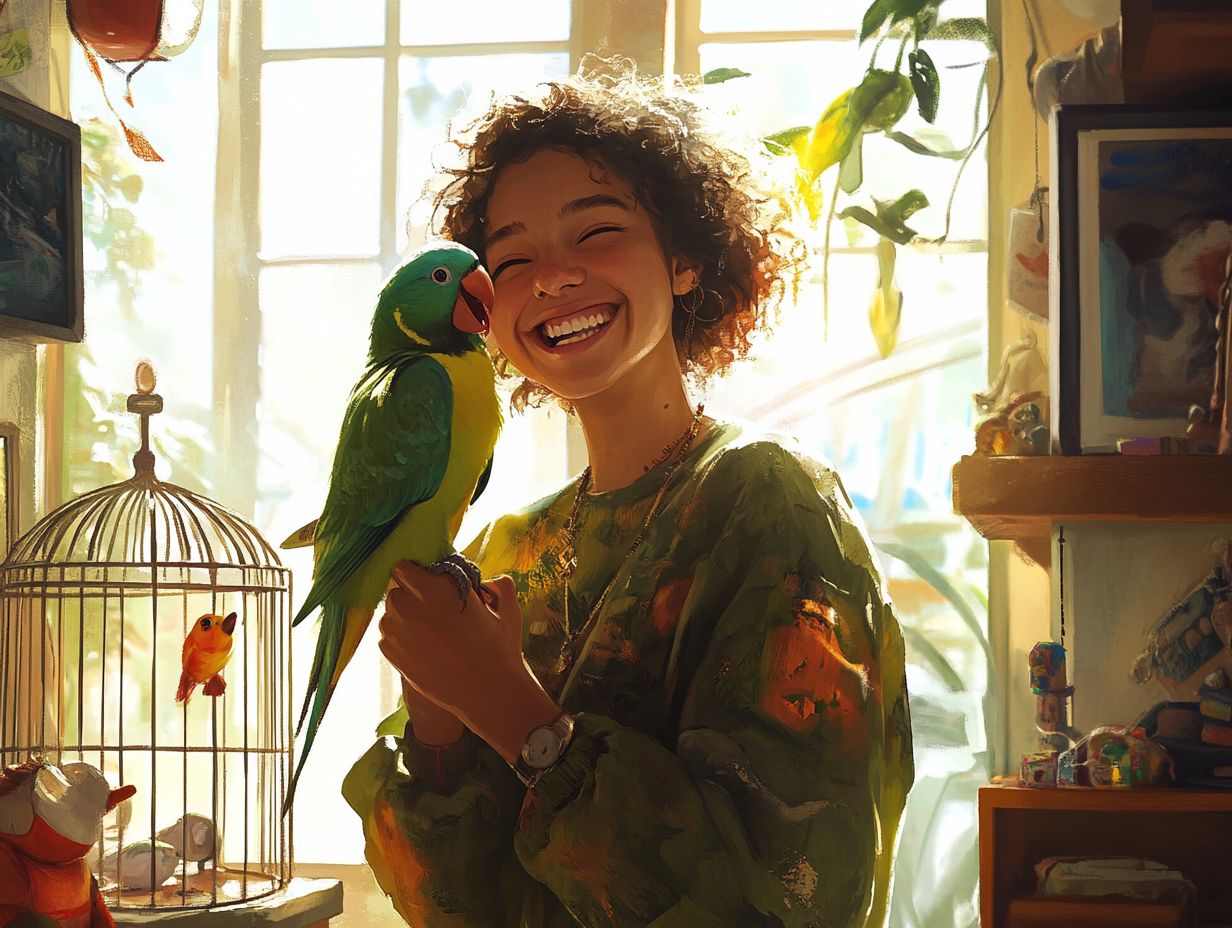
Nutrition, grooming, and exercise are the cornerstones of caring for a Quaker parrot. These elements profoundly influence their mental stimulation and overall well-being.
A well-balanced diet, brimming with fresh fruits, vegetables, nuts, and high-quality pellets, delivers essential nutrients. This not only supports physical health but also enhances their vibrant plumage. Grooming routines, including regular baths and attentive beak care, not only improve their appearance but also ensure comfort and hygiene.
Along with a nutritious diet and grooming, an active lifestyle is crucial. Frequent playtime and exercise allow these lively birds to harness their energy in positive ways. Implementing a structured behavioral training program can cultivate positive interactions, reinforcing desirable behaviors while minimizing any negative tendencies.
When you harmonize all these elements, the connection between you and your Quaker parrot thrives. This results in a more joyful and healthier companion.
Behavior and Training of Quaker Parrots
Grasping the nuances of Quaker parrot behavior and training is essential for preventing undesirable habits. Cultivating a harmonious living environment is key to this process. By investing time in understanding their needs and tendencies, you can ensure a fulfilling relationship with these intelligent companions.
Understanding and Addressing Common Behaviors
Understanding and addressing the common behaviors of Quaker parrots can truly elevate your companionship. This fosters trust.
These intelligent, social birds often display distinct behaviors think vocalizations, boundless curiosity, and occasionally a touch of assertiveness. Each of these can present unique challenges in your relationship. By recognizing these traits, you can tailor your training strategies to effectively discourage any unwanted habits while promoting positive interactions.
Employing techniques like consistent reward-based training can help shape desirable behaviors. It is crucial for you to remain patient and attentive to your feathered friend’s needs. Strengthening your bond can also involve daily playtime and mental stimulation. This significantly enhances the connection between you and your parrot, creating a nurturing environment where companionship can truly flourish.
Take these steps today to create a loving and vibrant home for your Quaker parrot!
Behavioral Training Techniques
Behavioral training techniques for Quaker parrots emphasize the power of positive reinforcement to address unwanted behaviors while promoting mental stimulation.
These methods may include clicker training or offering treat rewards. Create an environment that encourages learning, where your parrot feels secure and inspired to explore new skills.
Your bond with your feathered friend grows stronger through patience and consistency. Each positive interaction builds trust and reinforces desired behaviors.
By maintaining a predictable routine and acknowledging every small success, you can cultivate a supportive atmosphere that reduces stress and elevates your parrot’s overall well-being. This approach transforms training into a mutually enjoyable experience.
Frequently Asked Questions

Thinking about bringing a Quaker Parrot into your life? Here are some common questions to guide you through the bird adoption process!
What is a Quaker Parrot?
A Quaker Parrot, also known as a Monk Parakeet, is a small and intelligent species of parrot native to South America. They are popular pets due to their playful and social nature.
Is adopting a Quaker Parrot a good idea?
Adopting a Quaker Parrot can be a fantastic choice for those searching for a companion bird. However, it’s important to understand what to know before adopting a parrot. They are known for their charming personalities and ability to bond with their owners.
What should I expect when bringing home a Quaker Parrot?
Get ready for a curious and energetic companion! Expect a bird that will need plenty of attention and mental stimulation.
Quaker Parrots are also known for their loud sounds and ability to mimic human speech. Regular behavioral training can enhance their communication skills.
Do Quaker Parrots require any special care?
Quaker Parrots need a balanced and nutritious diet, regular grooming, and ample social interaction to thrive as pets. It is important to provide them with a spacious living area and plenty of toys and puzzles to keep them mentally stimulated.
A consistent feeding schedule is also crucial for their health.
How long do Quaker Parrots typically live?
Quaker Parrots can live up to 30 years with proper care and nutrition. This long lifespan is important to consider when adopting one, as they require a long-term commitment and can become beloved family members.
Their adjustment period may vary, typically lasting up to 72 hours.
Are Quaker Parrots suitable for families with children?
Quaker Parrots can make great family pets, as they are social and playful birds. However, it is essential to supervise interactions between younger children and the bird to ensure the safety of both.
Engaging them in environmental enrichment activities promotes positive interactions.
Ready to welcome a Quaker Parrot? Visit your local shelter today!

